Transcript
Rob's Interview
Idol chatter
ROBERT PATTINSON is taking his first few steps on a long road. You don’t get any sense that he is ashamed of Twilght. He would be a fool (and he’s no fool) to adopt any such stance. One can, after all, safely assume that the adaptations of Stephenie Meyer’s vampire novels have put him in a position where he need never work again. But, as the final part looms, he wants to put some distance between himself and the pale, dreamy Edward Cullen.
The latest lunge for freedom involves a fascinating collaboration with David Cronenberg. The Canadian director’s Cosmopolis, adapted from a novel by Don DeLillo, finds the Tsar of Cheekbones playing a young asset manager confined within an absurdly well-appointed limousine.
Pattinson has arrived in Cannes to promote the film. But nobody is allowing him to escape his past life. Why, Eric Packer, the protagonist of Cosmopolis, is just a another class of vampire, is he not? Pattinson must identify with him personally. Like Mr Packer, the actor – a victim of hyper-fame – is driven into a class of seclusion.
“I’m not the best self-analyst,” Pattinson says in his polite accent. “I can’t consciously bring anything from my life into my work. I don’t know. He is just trying to find something. It’s about the hopelessness of it all. It’s about the claustrophobia of being looked at. I wasn’t that much of a social person anyway. So, I don’t really care. Why can I not just answer the question?”
Raised in outer London, Pattinson spent some time as a model before drifting into acting. He remembers, with some embarrassment, securing a role in Mira Nair’s Vanity Fair, then turning up at the premiere to find that all his scenes had been cut. Further inconveniences followed. He was sacked from a play in the Royal Court. But he then managed to gain a part in the cinematic behemoth that was Harry Potter. Unfortunately, Cedric Diggory was among of the select band of Hogwarts students to be killed off. What were the odds?
Then came Twilight, and much to his surprise, he soon found himself an object of fanatical desire. But he does seem to be telling the truth when he claims that he prefers the quiet life. He has, for example, kept admirably quiet about his relationship with Twilight co-star Kristen Stewart.
“When you are followed constantly by fanatical fans, you try to eliminate the times you come up against them. That’s why I hide myself sometimes,” he said recently.
A serious cinema nut, he was never likely to resists the opportunity to work with Cronenberg. The director of Dead Ringers, The Fly and Eastern Promises remains the most singular cinematic terrorist of his era. Pattinson does not pause when asked what drew him to Cosmopolis.
“Cronenberg, obviously! I have played in only a few films, and none of them came close to what I expected working with him would be like. I wasn’t disappointed. I knew he would be very creative, and that it would be a real experience,” he says.
But David is an odd, fellow, is he not? The most cerebral director ever to launch a horror career, he is more likely to reference Freud and Nietzsche than Wes Craven or George A Romero. “For preparation, I spent two weeks in my hotel room worrying and confusing myself,” he laughs. “The weekend before we began shooting, I phoned David and said I want to ask one question: ‘Do you want to talk about the movie for a second?’ I went round to his house and he said: ‘Let’s just start and something will happen’.”
He furrows his magnificent brow and whitters some more about the poetry of the script, before breaking down.
“If you’re trying to do something in a cerebral way, it becomes about ego. Actors aren’t supposed to be intelligent.”
He does himself a disservice. Pattinson has the chops to separate himself from young Mr Cullen and forge a career among the living. But it is a long, long road. Be aware, Robert. Fifty years on from Dr No, journalists are still asking Sean Connery about James Bond.
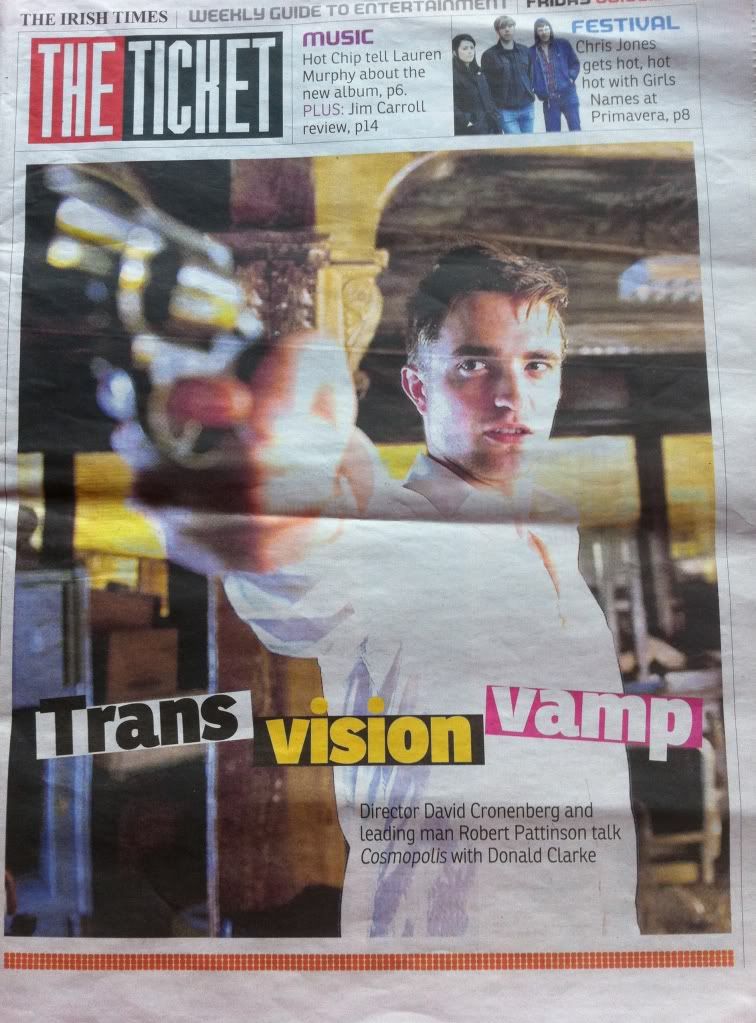
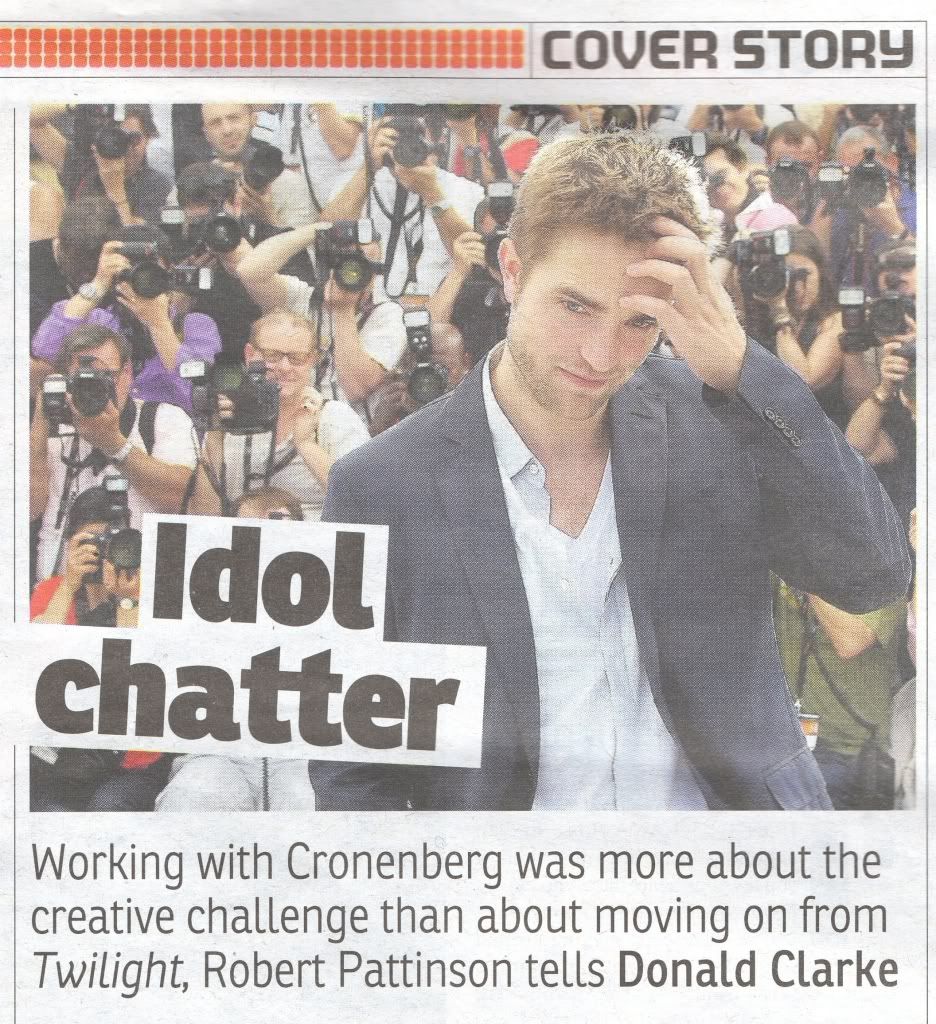
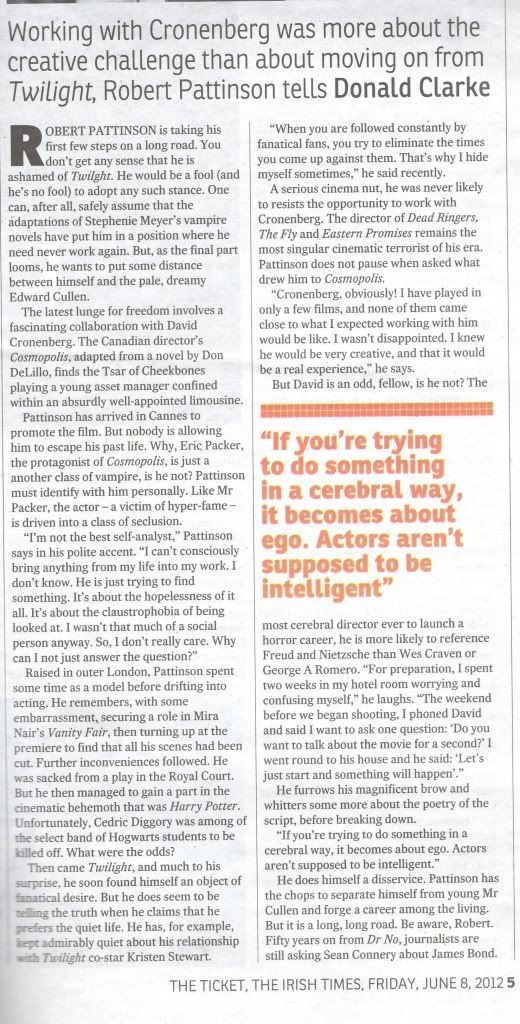
David's Interview
Gruesome truths
A RUMBLE OF THUNDER greets the arrival of David Cronenberg. It would be unfair to say that it’s a little like a scene from one of his films. The director is far too clever to dabble in such crude sound design. Besides which, we no longer think of him as a Gothic figure. Do we? At any rate, the pathetic fallacy certainly provides Mr Cronenberg with a dramatic entrance.
The Cannes Film Festival is drawing to a close and Mr Cronenberg has arrived on the penthouse of the Marriot Hotel to discuss his strange new film, Cosmopolis. Robert Pattinson plays a rich young man travelling through an apocalyptic New York in a huge, self-sufficient limousine. Though based on a Don DeLillo novel written as long ago as 2003, Cosmopolis has plenty to say about the current financial meltdowns.
Cronenberg has always made serious films. Early works, made on minuscule budgets in his native Canada, such as Shivers and Rabid abounded with disgusting imagery, but they addressed complex questions concerning mortality and the nature of human sexuality.
Read the rest of David's Interview & check out the scans After The Cut
“Even, if you look at Shivers, I think the dialogue is very interesting,” he says. “In a low-budget horror film, people are always interested in the gore and the special effects. I think it was funny and eccentric. I worked hard to make the dialogue interesting.”
That said, he does now seem (not necessarily a good thing) like a more respectable figure. He has headed the jury at this place. His last picture, A Dangerous Method, examined the relationship between Sigmund Freud and CJ Jung. What does he make of this notion that his sensibility has matured?
“No, no, no,” he says in his quiet, academic way. “I certainly am more mature. I mean I am actually older. My film-making is, maybe, more mature in that it is more confident. I had 40 days to shoot this and I finished it in 35. I do one or two takes. Back in 1988, I would shoot this angle and that angle.”
So he now has more confidence? One would think so. David has been at this lark for well over four decades. Whippet thin, his hair still teased into that Eraserhead bouffant, he answers questions with the logical discipline of a boffin asked to explain his latest musings on string theory. Indeed, his first ambition was to become a scientist. Raised in Toronto, he initially studied science at that city’s university before switching to English literature. Inspired by colleagues, he then improvised his way into a film career.
When did this confidence finally assert itself?
“The third day of shooting my first movie,” he says with a dry smile. “But it’s a matter of how much confidence – confidence to know that you don’t need certain things. As I say, in the early days, I would do a lot of coverage, then spend a lot of time in the editing suite putting it together.”
He goes on to explain (almost boast) that about nine days after finishing the shoot for Cosmopolis he had a first director’s cut.
“With my first commercial movie, I kept complaining that I didn’t like the size of the heads. I thought: maybe I really can’t do this. I’d done my own cinematography. But I hadn’t done it with a crew. Then I felt it was starting to look good. That was a major moment.”
American critics have long been suspicious of horror. For a long time, Cronenberg was viewed as a dangerous weirdo with an unattractive penchant for tearing the innards from his lead actors. The Brood starred Oliver Reed in the tale of apparently demented monster children. Scanners became notorious for its scenes of exploding heads. Videodrome made something viscerally revolting of contemporaneous pop culture.
As his career progressed, however, wiser pundits began to notice the rigorous thinking behind his gruesome aesthetic. The Fly was a massive financial and critical hit. Dead Ringers, in which Jeremy Irons plays deranged twins, remains his most celebrated picture.
Times have moved on. Cosmopolis is, quite rightly, regarded as the latest missive from a modern master. There are moments of horror, but the picture remains, for the most part, a fairly sober affair. It abounds with echoes of our current travails. At one point, accidentally referencing an event in the Leveson Inquiry, Mathieu Amalric gets to wield a custard pie in anger.
“All that was completely by accident,” Cronenburg says. “I wrote the script before I did A Dangerous Method. Suddenly we found ourselves shooting riot scenes during Occupy Wall Street. It was bizarre. At a certain point, Paul Giamatti texts me to say that Rupert Murdoch just got a pie in the face. What’s going on? We weren’t making this movie as a documentary. Don DeLillo, like any writer, is not trying to be a prophet.”
Not surprisingly, the marketing men are focusing much attention on their leading man. For some time, our own Colin Farrell was pencilled in to play the protagonist. Sadly, scheduling commitments on the upcoming remake of Total Recall ruled him out.
“What age is the character? Colin Farrell was 33 or 34. Are we going to go with that? We were thinking of him. At which point, we maybe would have had Marion Cotillard as his wife. But once we got Rob, it was clear she’s not the right wife. You don’t just cast one person; you cast the whole movie. Maybe, Colin was too old.”
So, why Robert Pattinson?
“Don’t you think he’s good?” he says.
I do actually.
“I knew he would be good, but I had to convince him he would be good. He is a serious enough cinephile that he doesn’t want to fuck the movie up. All actors have this insecurity that they’re going to be the bad actor in the piece. Even guys like Olivier worried that they were not good enough. It goes with acting. It’s up to me to say: ‘You can do that’.”
Cronenberg finds himself running a family business at Cannes. While Cosmopolis plays in the main competition, Antiviral, directed by one Brandon Cronenberg, screens in Un Certain Regard, the main sidebar event. Cannes-watchers believe this is the first time films by a father and son have screened in the headline competitions.
IrishTimes Via Robsessedblog

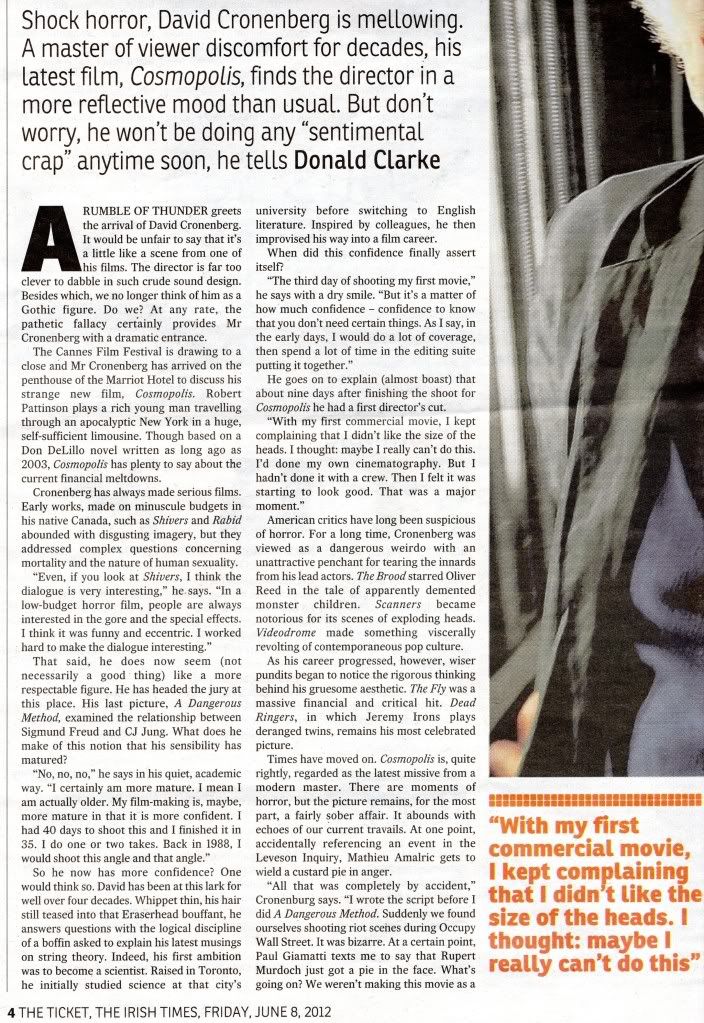
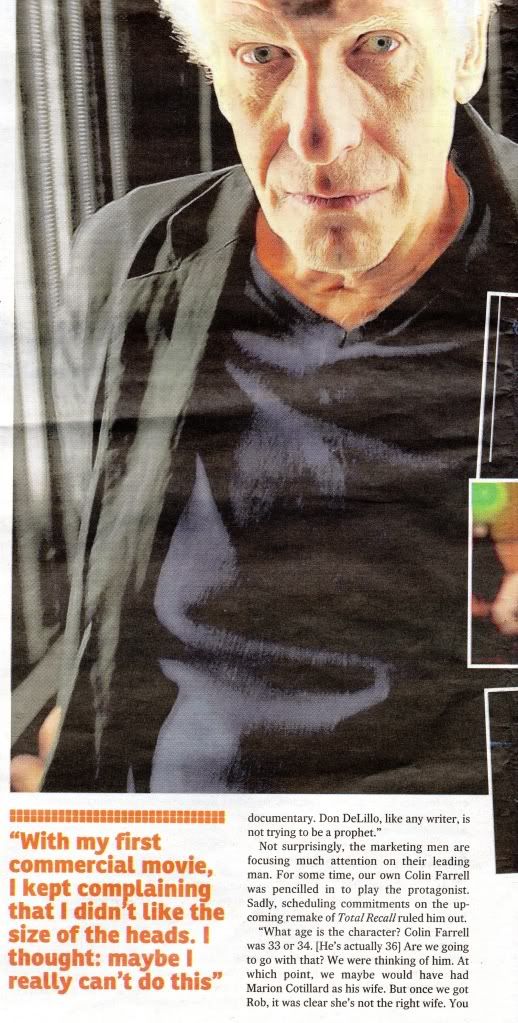
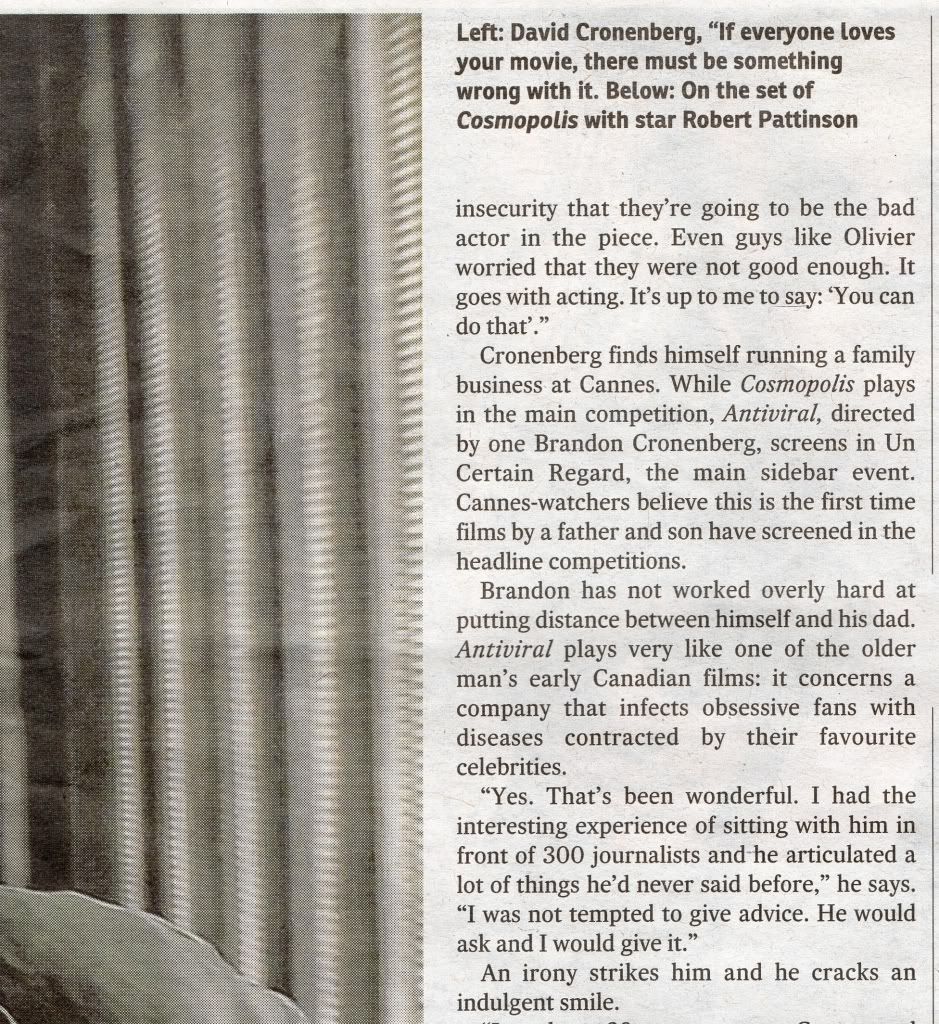
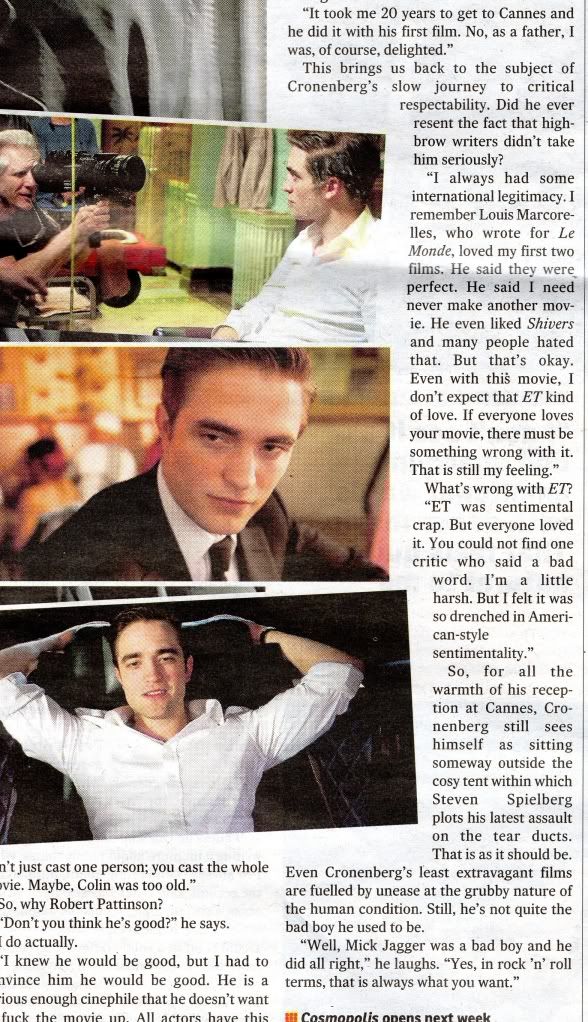
Inga kommentarer:
Skicka en kommentar